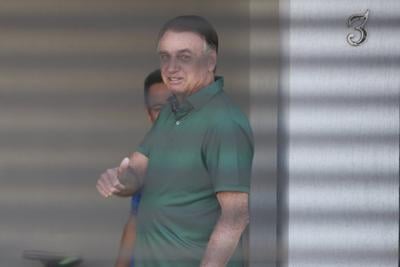BRASILIA, Brazil (AP) ŌĆö Brazil’s former President Jair Bolsonaro has been convicted of attempting a coup to stay in office after losing his reelection bid in 2022.
He is the first former president found guilty of trying to overturn an election in the country with the largest economy in Latin America. Bolsonaro has always denied wrongdoing.
Four of the five justices on the Supreme Court panel voted to convict him Thursday and sentenced him to 27 years and three months in prison. But this doesn’t mean he will go to prison right away.
HereŌĆÖs what to know about the process against Bolsonaro and what’s coming next:
The charges
Prosecutors charged him with five crimes, including attempting a coup after losing the 2022 race to , participating in an armed criminal organization, attempted violent abolition of the democratic rule of law, damage qualified by violence, and deterioration of listed heritage.
According to the evidence presented by the attorney general, Bolsonaro gathered Cabinet and military officials to discuss an emergency decree that would have suspended the election results in order to investigate unproven electoral fraud claims.
Justice Alexandre de Moraes, who oversaw the case, said Bolsonaro carried out a series of acts from 2021 through that constituted the attempted coup. The actions included casting doubt on BrazilŌĆÖs electronic voting system, drafting a decree to annul the election results and encouraging the riots on Jan. 8, 2023, that aimed to force a military takeover.
Will Bolsonaro go to prison?
He won’t go to prison now, but he will remain
With the sentence announced, the court panel has up to 60 days to publish the ruling. Once it does, Bolsonaro’s attorneys have five days to file motions for clarification.
His lawyers have said that they will try to appeal both the conviction and sentence before the full Supreme Court of 11 justices, although some experts think it’s unlikely to be accepted.
ŌĆ£ItŌĆÖs unlikely, but not impossible, that there will be appeals to the full Supreme Court,” said Rafael Mafei, lawyer and law professor at University of S├Żo Paulo and ESPM university. ŌĆ£But of course, the defenses will try, because they should,ŌĆØ he added.
The Supreme Court’s press office told The Associated Press that, according to the court’s jurisprudence, the full court can accept an appeal only if there’s at least two dissenting votes in a ruling. And in this case, only one of the five justices disagreed and called for Bolsonaro’s acquittal.
Once there’s a firm sentence, Bolsonaro could go to prison.
But it is unlikely he would be transferred to a regular prison. As a former president, he has the right to special incarceration, which could take place at the Federal PoliceŌĆÖs main building in Brasilia.
Reaction by the United States
BolsonaroŌĆÖs trial got renewed attention after U.S. President Donald Trump to his allyŌĆÖs legal situation, calling it a ŌĆ£witch hunt.ŌĆØ
Observers think the U.S. might announce new sanctions against Brazil after the trial, and the Trump administration on Thursday hinted that it might.
Trump said he was ŌĆ£very unhappyŌĆØ with the conviction, and Secretary of State Marco Rubio said on his X account that the U.S. government ŌĆ£will respond accordingly to this witch hunt.ŌĆØ
Government officials or Supreme Court justices could be sanctioned, in late July, said Oliver Stuenkel, a professor of international relations at the Getulio Vargas Foundation, a think tank and university.
The reaction ŌĆ£could also involve broader visa restrictions for government officials, or more tariffs,ŌĆØ Stuenkel said. ŌĆ£ItŌĆÖs quite unpredictable.ŌĆØ
What’s next for the far-right in Brazil?
Despite his legal woes, Bolsonaro remains a powerful political player in Brazil. The conviction could add pressure on him to pick a political heir to possibly challenge Lula in the general elections next year. It could also compel allied lawmakers to seek some amnesty for the former president through Congress.
Bolsonaro had previously been previously from running for office until 2030 in a separate case.
___
S├Ī Pessoa reported from Sao Paulo.
___
Follow APŌĆÖs coverage of Latin America and the Caribbean at


























